| 2016, Cilt 32, Sayı 2, Sayfa(lar) 089-093 | |
| [ Özet ] [ PDF ] [ Benzer Makaleler ] [ Yazara E-Posta ] [ Editöre E-Posta ] | |
| Effect of dexamethasone treatment on blood oxidative status and prostaglandin F2α metabolite levels in ram | |
| Ayşe Er1, Orhan Çorum1,2, Hatice Eser1,2, Emre Bahçivan1,3, Burak Dik1, Enver Yazar1 | |
| 1Selçuk Üniversitesi, Veteriner Fakültesi, Farmakoloji ve Toksikoloji Anabilim Dalı, Konya, Türkiye 2Dicle Üniversitesi, Veteriner Fakültesi, Farmakoloji ve Toksikoloji Anabilim Dalı, Diyarbakır, Türkiye 3Kafkas Üniversitesi, Veteriner Fakültesi, Farmakoloji ve Toksikoloji Anabilim Dalı, Kars, Türkiye |
|
| Keywords: Ram, dexamethasone, TBARS, PGM | |
| Abstract | |
Aim: The first aim of this research was to determine the effects of
dexamethasone on serum thiobarbituric acid reactive substances
(TBARS) and plasma 13,14-dihydro-15-keto-prostaglandin-F2α
(PGM) levels in healthy rams. In addition, effects of dexamethasone
on the hemogram and biochemical parameters were evaluated. Materials and Methods: Single dose dexamethasone (0.5 mg/kg, SC) was administered to 10 rams. Blood samples were collected before (0. hour, Control group) and after drug treatment at 0.25, 0.5, 1, 2, 4, 8, 12 and 24 hours. Serum TBARS and plasma PGM levels were measured with ELISA reader. Hemogram values were determined with hemacell counter, whereas biochemical values were measured with auto-analyzer. Results: Dexamethasone caused statistically not significant fluctuations in the serum TBARS levels while it did no effect plasma PGM levels. Dexamethasone increased (P<0.05) the white blood cell and serum glucose levels. Conclusion: It may be stated that dexamethasone has no distinctive antioxidant and anti-PGM effects in healthy rams; however, different effects of dexamethasone may be observed in the sick situation. |
|
| [ Başa Dön ] [ Özet ] [ PDF ] [ Benzer Makaleler ] [ Yazara E-Posta ] [ Editöre E-Posta ] | |




